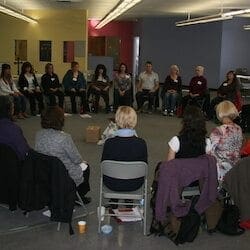Education changemakers: social and emotional learning
February 25, 2012

Last week, parents, teachers and the media were shocked at the results of a recent census among teens at the Toronto District School Board (TDSB), which revealed that 73% of high school students are worried about their future; 57% are losing sleep because of their worries; and 66% are under a lot of stress.
The psychological well-being of Canada’s youth is crucially important, not only for the sense of self and peace of mind of youth themselves, but also for the prosperity of our country. Depression and anxiety cost the healthcare system $8 billion per year and productivity losses are easily double that number.
The MaRS Education Innovation practice incubates a number of startups that are actively seeking to address this problem. The University of Toronto’s Factor-Inwentash Faculty of Social Work recently conducted research in partnership with MaRS client Mindfulness Without Borders, a charitable organization dedicated to providing a safe platform for peer-to-peer dialogue that addresses the social-emotional skills and secular mindfulness practices that are vital for coping in a complex world.
The research showed that, after a 12-week program, participants were applying social and emotional skills and mindfulness practices into their daily lives. Almost three-quarters of the participants found the program to be highly valuable: students were better able to cope with challenges, work with others, manage stress and anxiety, be calm and relaxed, cope with sadness and communicate more effectively with others. Clearly, the intervention is working.
Other startups—including Heliotrope, KEEN 5X, Iris the Dragon, Practi-Quest, Resilient Living and Twenty One Toys—seek to teach social and emotional skills in different ways. They are looking to scale solutions that teach children the skills they need to ensure their emotional well-being and to create real savings on the societal costs of mental illness.
A recent meta analysis of social and emotional learning programs involving more than 270,000 students in North America concluded that students who participated in these types of programs showed significantly improved social and emotional skills, as well as improvement in academic performance that reflected an 11-percentile-point gain in achievement (Child and Youth Mental Health Information Network).
The expansion of our education curriculum to include social and emotional health is no longer a luxury. We need to expand our vision of school to be more than just a repository for math and language skills, to be a place where young people can go to feel safe and learn social skills that will help them for the rest of their lives.
To this end, the MaRS Education Innovation practice invites Donna Quan, interim director of the Toronto Disctrict School Board down to MaRS for an introduction to some of the programs that can make a real difference in Toronto’s schools.
For more information, contact Joseph Wilson of the MaRS’ Education cluster at jwilson@marsdd.com.